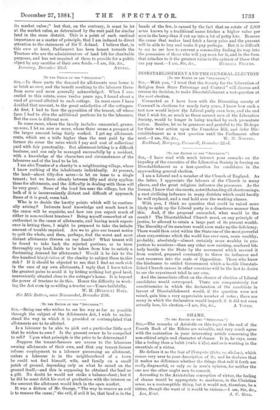SHAME.
[To THE EDITOR OF THE " SPECTATOR."]
Sin,—The remarks of Aristotle on this topic at the end of the Fourth Book of the Ethics are valuable, and very much agree with the contention in your interesting article concerning the non-ethical origin and character of shame. It is, he says, more like a feeling than a habit (with' ;Au), and so is wanting in the essentials of a virtue.
He defines it as the fear of ill-repute (Vi3o; TI; Earofilet4, which comes very near to your description of it ; and he declares that it makes no difference whether the things that call it forth are really disgraceful, or only so in men's opinion, for neither the one nor the other ought men to commit.
According to the Aristotelian conception of virtue, the feeling of shame would be appropriate to meekness, in the Christian sense, as a contemptible thing, but it would not, therefore, be a virtue, though the want of it would be vicious.—I am, Sir, &c.,


































 Previous page
Previous page